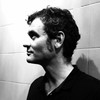Advertisement

Advertisement
Inside the Town Hall Hotel. Stephanie McCarthy said her attackers wouldn't have been in Newtown a couple of years ago. Photo by Charlotte Bauer.
Advertisement
The Imperial Hotel has recently been shut down. Photo by Charlotte Bauer.
Advertisement
Aaron Manhattan performing at the Imperial Hotel. Photo supplied.
